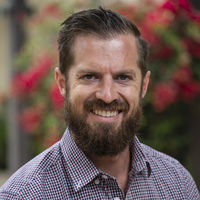Papers by Garrett Pendergraft

Philosophical Studies, Nov 2012
The Consequence Argument has elicited various responses, ranging from acceptance as obviously rig... more The Consequence Argument has elicited various responses, ranging from acceptance as obviously right to rejection as obviously problematic in one way or another. Here we wish to focus on one specific response, according to which the Consequence Argument begs the question. This is a serious accusation that has not yet been adequately rebutted, and we aim to remedy that in what follows. We begin by giving a formulation of the Consequence Argument. We also offer some tentative proposals about the nature of begging the question. Although the charge of begging the question is frequently made in philosophy, it is surprisingly difficult to pin down the precise nature of this dialectical infelicity (or family of such infelicities). Thus we offer some new proposals about the nature of begging the question with an eye to understanding what is going on in central cases in which the charge is legitimately made. We then defend the Consequence Argument against the charge that it begs the question, so construed. We contend that, whatever the other liabilities of the argument may be, it does not beg the question against the compatibilist.
Traditional views about God and about deliberation seem to imply that we need a deliberation rest... more Traditional views about God and about deliberation seem to imply that we need a deliberation restriction on the concept of divine omniscience. I will argue, however, that this deliberation restriction is both irrelevant and unnecessary. It is irrelevant because there is no time at which God needs to deliberate; and it is unnecessary because even if God does deliberate, it’s possible for him to do so while knowing what the results of that deliberation will be. And because this possibility of deliberating despite knowing the results holds for deliberation in general, my argument provides useful (and perhaps surprising) results not only for discussions of the divine attributes, but also for broader discussions of deliberation itself.

Philosophical Studies
Local miracle compatibilists claim that we are sometimes able to do otherwise than we actually do... more Local miracle compatibilists claim that we are sometimes able to do otherwise than we actually do, even if causal determinism obtains. When we can do otherwise, it will often be true that if we were to do otherwise, then an actual law of nature would not have been a law of nature. Nevertheless, it is a compatibilist principle that we cannot do anything that would be or cause an event that violates the laws of nature. Carl Ginet challenges this nomological principle, arguing that it is not always capable of explaining our inability to do otherwise. In response to this challenge, I point out that this principle is part of a defense against the charge that local miracle compatibilists are committed to outlandish claims. Thus it is not surprising that the principle, by itself, will often fail to explain our inability to do otherwise. I then suggest that in many situations in which we are unable to do otherwise, this can be explained by the compatibilist’s analysis of ability, or his criteria for the truth of ability claims. Thus, the failure of his nomological principle to explain the falsity of certain ability claims is no strike against local miracle compatibilism.

Oxford Studies in Philosophy of Religion
The Ockhamist claims that our ability to do otherwise is not endangered by God’s foreknowledge be... more The Ockhamist claims that our ability to do otherwise is not endangered by God’s foreknowledge because facts about God’s past beliefs regarding future contingents are soft facts about the past—i.e., temporally relational facts that depend in some sense on what happens in the future. But if our freedom, given God’s foreknowledge, requires altering some fact about the past that is clearly a hard fact, then Ockhamism fails even if facts about God’s past beliefs are soft. Recent opponents of Ockhamism, including David Widerker and Peter van Inwagen, have argued along precisely these lines. Their arguments, if successful, would undermine Ockhamism while avoiding the controversy over the alleged softness of facts about God’s past beliefs. But these arguments do not succeed. The past facts they rely on must be clear and uncontroversial examples of hard facts about the past, and these facts must be such that an ability to refrain from the relevant future action implies an ability to alter the relevant hard fact. We demonstrate the flaw in these arguments by showing how they rely on past facts that do not satisfy these criteria. The Ockhamist may have troubles, but this type of argument is not one of them.
The Jonathan Edwards Encyclopedia, 2017
Jonathan Edwards’s views on the nature of the human will demonstrate his unique ability to unite ... more Jonathan Edwards’s views on the nature of the human will demonstrate his unique ability to unite philosophical rigor and theological fervor. Edwards was a staunch defender of the Reformed doctrines of absolute divine sovereignty and meticulous providence, but he was also a proponent of the intellectual tools and methods of early modern philosophy (and of John Locke in particular). This brief summary of Edwards’s doctrinal positions in Freedom of the Will offers a glimpse of his philosophical and theological commitments.

Causality in the Sciences, Jan 1, 2011
Causalists about explanation claim that to explain an event is to provide information about the c... more Causalists about explanation claim that to explain an event is to provide information about the causal history of that event. Some causalists also endorse a proportionality claim, namely that one explanation is better than another insofar as it provides a greater amount of causal information. I consider various challenges to these causalist claims. There is a common and influential formulation of the causalist requirement—the “Causal Process Requirement”—that does appear vulnerable to these anti-causalist challenges, but I argue that they do not give us reason to reject causalism entirely. Instead, these challenges lead us to articulate the causalist requirement in an alternative way. This alternative articulation incorporates some of the important anti-causalist insights without abandoning the explanatory necessity of causal information. For example, proponents of the “equilibrium challenge” argue that the best available explanations of the behavior of certain dynamical systems do not appear to provide any causal information. I respond that, contrary to appearances, these equilibrium explanations are fundamentally causal, and I provide a formulation of the causalist thesis that is immune to the equilibrium challenge. I then show how this formulation is also immune to the “epistemic challenge”—thus vindicating (a properly formulated version of) the causalist thesis.

SAGE Business Cases, 2019
In August 2017, Google executives found themselves in a difficult position. An internal memo writ... more In August 2017, Google executives found themselves in a difficult position. An internal memo written by a disgruntled software engineer, James Damore, had just gone viral. In this memo, Damore claimed that the relatively small number of women in the tech industry was partly due to biological factors, and that many of Google’s diversity efforts were therefore counterproductive. The contents of this memo were offensive to many (and thus were having a negative impact on the overall workplace environment), but the executives were aware that the wrong reaction to it would at least partially vindicate Damore’s claims about the lack of open discussion at Google. In the end, after two days of controversy, Google leadership decided to fire Damore on the grounds that he had violated the company’s code of conduct. This case gives students an opportunity to explore the numerous issues raised by Damore’s memo and the controversy surrounding it. Did Google handle this case properly? Was firing Damore the right thing to do? How could the situation have been handled more effectively?

SAGE Business Cases, 2021
This case examines the rise and fall of WeWork—a company that experienced one of the most dramati... more This case examines the rise and fall of WeWork—a company that experienced one of the most dramatic changes of fortune in technology company history. For several years, WeWork was a Silicon Valley darling, growing at breakneck speed with visionary Adam Neumann at the helm. By some estimates, Neumann’s company was worth USD 47 billion in January of 2019. But when the company filed paperwork in preparation for going public later that year, investors balked at the details revealed in the documents: billions of dollars in losses and lots of questionable behavior on the part of Neumann (including numerous conflicts of interest involving his personal business dealings). The initial public offering was postponed and later withdrawn; Neumann was forced to step down as CEO; and by May of 2020 the company’s valuation had dropped to USD 3 billion. Exploring this recent history will provide an opportunity to ask what lessons can be drawn from the rise and fall of WeWork, and from the economic and social context that enabled its growth.
SAGE Business Cases, 2021
There have been several recent lawsuits in which problem gamblers (or those affected by problem g... more There have been several recent lawsuits in which problem gamblers (or those affected by problem gambling) have sued casinos or other gaming companies for damages relating to bankruptcies, suicides, and other negative consequences of compulsive gambling. Although the legal cases have been decided in favor of the gaming companies, it can seem as though there is a moral residue in some of these cases: perhaps some of the actions of the gaming companies, though legal, have been morally problematic. This case invites students to explore this possibility by introducing them to the facts surrounding the lawsuits and highlighting some of the most salient moral considerations. Students will also be asked to reflect on the public policy implications, if any, of their findings.

SAGE Business Cases, 2021
Are the wishes of the dead more important than the needs of the living? This question is prompted... more Are the wishes of the dead more important than the needs of the living? This question is prompted by consideration of the Hershey Trust Company, a perpetual charitable trust that not only owns and operates the Milton Hershey School in Pennsylvania but also owns a controlling interest in various Hershey-related for-profit entities. This unusual arrangement, and the conditions under which it was formed, have produced a situation in which a small, private boarding school for low-income students has an endowment of USD 12 billion (in addition to its other corporate and real estate interests). The trust has been operating according to its founder’s wishes for decades, but some have wondered whether its resources could be put to better use for more urgent needs. This case will invite students to consider the question of how we should weigh the needs of the living against the wishes of the dead.

SAGE Business Cases, 2021
Since Uber's founding in 2009, individuals associated with Uber have engaged in (or been accused ... more Since Uber's founding in 2009, individuals associated with Uber have engaged in (or been accused of engaging in) numerous categories of corporate malfeasance: failure to protect data privacy, theft of trade secrets, sexual misconduct (including sexual assault and sexual harassment), lack of worker safety, lack of consumer safety, and racial discrimination. Thus, Uber is a good test case for the question of whether corporate behavior can provide moral justification for a boycott. More specifically, an examination of the 2017 #deleteUber controversy will invite the reader to consider questions such as the following: When is a personal boycott morally justified, and when (if ever) is a personal boycott morally obligatory? How are personal boycotts related to larger-scale organized boycotts? What are the factors that make an organized boycott morally justified (or unjustified)? Is there a sound argument for the conclusion that we should #deleteUber?

SAGE Business Cases, 2021
In the one-for-one business model, a purchaser of, for example, a pair of shoes simultaneously pu... more In the one-for-one business model, a purchaser of, for example, a pair of shoes simultaneously purchases a pair of shoes for a child in need. This model, popularized by TOMS shoe company in 2006, has been remarkably successful. The driving force behind the success is most likely the emotional appeal of the one-for-one idea. The TOMS model has been criticized, however--not just for being less effective than advertised, but for arguably doing more harm than good. Whether or not this latter charge is true, the TOMS story serves as an illustrative starting point for an exploration of the ways in which commonsense thinking about charity and philanthropy is often wrong. Examining these criticisms will set the stage for an examination of the influential "effective altruism" movement and invite the reader to think more deeply about different ways of doing good in the world.

SAGE Business Cases, 2021
Should we kill animals to save animals? This question lies at the heart of this case study. Sover... more Should we kill animals to save animals? This question lies at the heart of this case study. Sovereign nations have an interest in protecting and conserving their natural resources, and, in particular, their distinctive flora and fauna. As they seek to promote these interests, they inevitably face the economic question of how they are going to finance their conservation efforts. One way of answering this question is to engage in the practice of selling big game hunting licenses and using the revenues to fund conservation programs. This strategy is counterintuitive (and, to some, morally repellent), but it has a partial track record of success in places such as Namibia, South Africa, and the United States. Despite its successes, there are some who believe that the moral objections to such a strategy outweigh any potential benefits. This case study provides the student with an opportunity to explore the tension between the desire to save endangered animals and the possibility that the best way to do that involves killing some of them.
Book Reviews by Garrett Pendergraft
Notre Dame Philosophical Reviews
s Motive and Rightness is an impressive and wide-ranging treatment of an important but relatively... more s Motive and Rightness is an impressive and wide-ranging treatment of an important but relatively under-explored question: Can the motive of an action affect its deontic status? (That is to say, does an action's motive ever determine whether that action is right or wrong?) According to Sverdlik, the answer is yes: Motives matter.

Hugh McCann’s Creation and the Sovereignty of God is a comprehensive and ambitious treatment of s... more Hugh McCann’s Creation and the Sovereignty of God is a comprehensive and ambitious treatment of some of the most difficult questions surrounding the traditional conception of God and his relationship to the created order. Two features of this treatment make it distinctive: McCann’s theodicy of sin and suffering, which takes up the bulk of the book, and his endorsement and articulation of a modified doctrine of divine simplicity (which is presented in the last chapter). After giving a positive argument for the existence of God, he mostly plays defense: he deftly explains the various difficulties that arise when we try to reconcile intuitive or otherwise well-established physical and metaphysical truths with the traditional doctrines of God, and then offers an extended account that attempts to affirm many of those well-established truths while maintaining a robust commitment to God’s perfection and absolute sovereignty.
This volume collects a set of papers that were presented at a conference on “Big Questions in Fre... more This volume collects a set of papers that were presented at a conference on “Big Questions in Free Will,” held at the University of Saint Thomas in October of 2014. It is dedicated to its editor, who passed away shortly after completing the manuscript. In this review, I briefly summarize each of the 11 chapters and then offer a few critical comments.









Uploads
Papers by Garrett Pendergraft
Book Reviews by Garrett Pendergraft